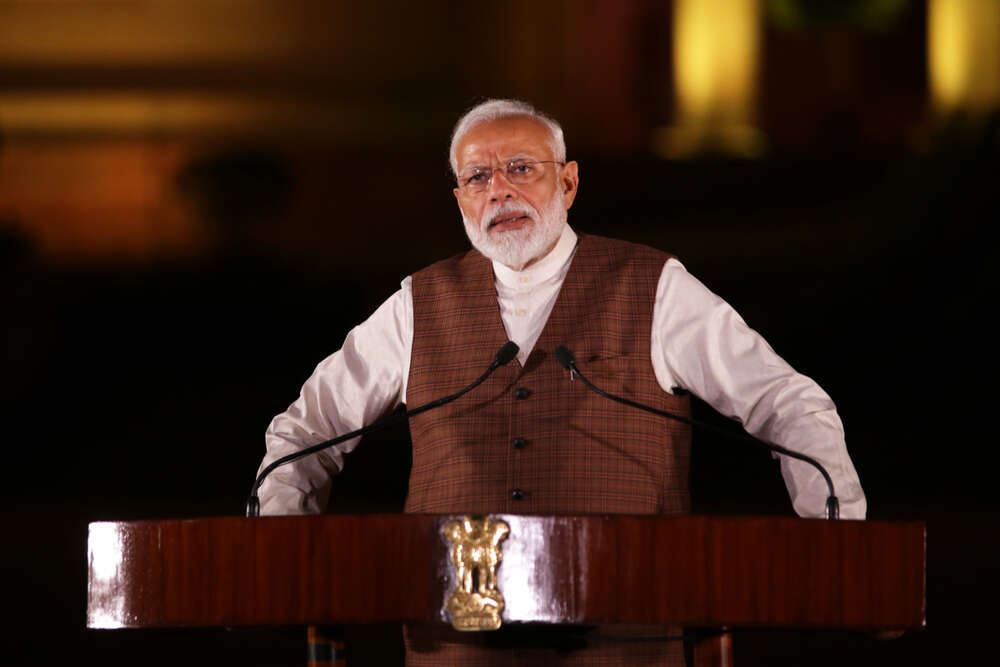

- Despite pledging to triple renewable energy sources by 2030, the G20 in India stopped short of demanding coal phase-out, instead committing to a “phasedown of unabated coal power”.
- India has seen a 29% increase in per capita coal emissions over the last seven years.
- None of India’s top banks have net-zero targets. Few disclose emissions or green finance data, and most lack policies against financing coal-fired power projects.
Last week’s two-day summit in India’s capital New Delhi of the Group of 20 major economies (G20) was a washout. Although it did conclude with a summit statement – by no means a given – which was described by Indian Prime Minister Narendra Modi as the “most ambitious in the history of G20”, it stank of compromise.
Founded in 1999 in the aftermath of the Asian financial crisis, the finance ministers and heads of state of 19 sovereign countries and the European Union, meet once a year. This year the group was expanded to include the African Union.
Much of the coverage of the summit has focused on the lack of condemnation of Russia for its invasion of Ukraine. Instead, it talked about “the immense human suffering and the adverse impact of wars and conflicts around the world” and called on states to “refrain from the threat or use of force to seek territorial acquisition”. A win for Russia’s Foreign Minister Sergei Lavrov.
But where the G20 summit truly failed was how it tackled fossil fuels. It did pledge to triple renewable energy sources by 2030, but instead of demanding that coal be phased out, it committed to a “phasedown of unabated coal power, in line with national circumstance”.
This is, of course, music to the ears of fossil fuel majors ahead of this year’s COP28 meeting in Dubai at the end of November.
Sustainability laggard
Even aside from its unshakeable support of Adani, in some senses, India is a sustainability laggard. In early September, London-based independent energy think tank Ember pointed out that India’s per capita coal emissions have increased by 29% in the past seven years.
But there are those who are more optimistic about its journey. Certainly, the prime minister’s office bangs the drum. In March, his office underlined the country’s intention to shape and promote sustainable growth.
He called for multilateral institutions and global financial institutions to be more “in sync with the requirements of climate finance”.
At the beginning of August professional service firm EY enthused that the country “sat at the forefront of the net-zero revolution” highlighting the changes that had been made.
The figures certainly appear impressive.
In India’s budget at the beginning of February, Finance Minister Nirmala Sitharaman highlighted the R350bn ($4.2bn) that had been set aside for the net-zero transition, and the Securities and Exchange Board of India (SEBI) has revised disclosure requirements for green debt and developed a framework for sustainable issuance.
EY underscores the fact that India already stands as the world’s third-largest producer of renewable energy, with 42% of its installed capacity sourced from clean and sustainable options, and the country has taken great strides towards sustainable agriculture and sustainable transportation.
Lack of banking support on climate change
But this is not being supported by the banking sector who seem little interested in climate change. In a follow-up to its analysis last year, Karnataka-based think tank Climate Risk Horizons has looked again at how India’s 34 largest banks are tackling climate risk. The results are not especially happy.
Banks were ranked out of 20 based on criteria that included fossil fuel exclusion policy, emissions disclosure, climate scenario analysis, climate-risk management, green finance, and net zero targets. None achieved full marks and 10 banks, including Bandhan Bank, IDBI Bank and Indian Overseas Bank, had scores of zero [see chart].
“The glaring absence of such an assessment of the Indian banking sector motivated our first report, published in March 2022. While there has been some slow progress since then, the banking system remains unprepared to confront climate risk,” the report says.
Maharashtra-headquartered Suryoday Small Finance Bank and Kerala-based Federal Bank continue to be the only banks which have a policy against financing new coal-fired power projects. Only ten out of 34 banks have started disclosing Scope 1 and 2 emissions or disclose how much green finance they have disbursed and only seven banks have publicly disclosed their list of excluded activities.
Not one bank has yet set a net zero target which covers all three Scope emissions.
“Indian banks are lagging both in terms of assessing material risks they face from the climate crisis, and managing the risk their operations pose to the climate,” is the report’s blunt conclusion.
Ahead of the publication of its World Energy Outlook report in October, Fatih Birol, executive director of the Paris-based International Energy Agency told the Financial Times earlier this week that “we are witnessing the beginning of the end of the fossil fuel era, and we have to prepare ourselves for the next era”.
The growth of clean energy technologies like solar panels and electric vehicles, together with the structural shifts in China’s economy and the ramifications of the global energy crisis mean that investments in coal could become stranded sooner rather than later, it argues.
For Indian banks to continue to hide their heads in the climate change sand looks increasingly like wilful denial rather than good business practice.
[Read more: India needs $1.1trn to tackle climate change by 2030]





